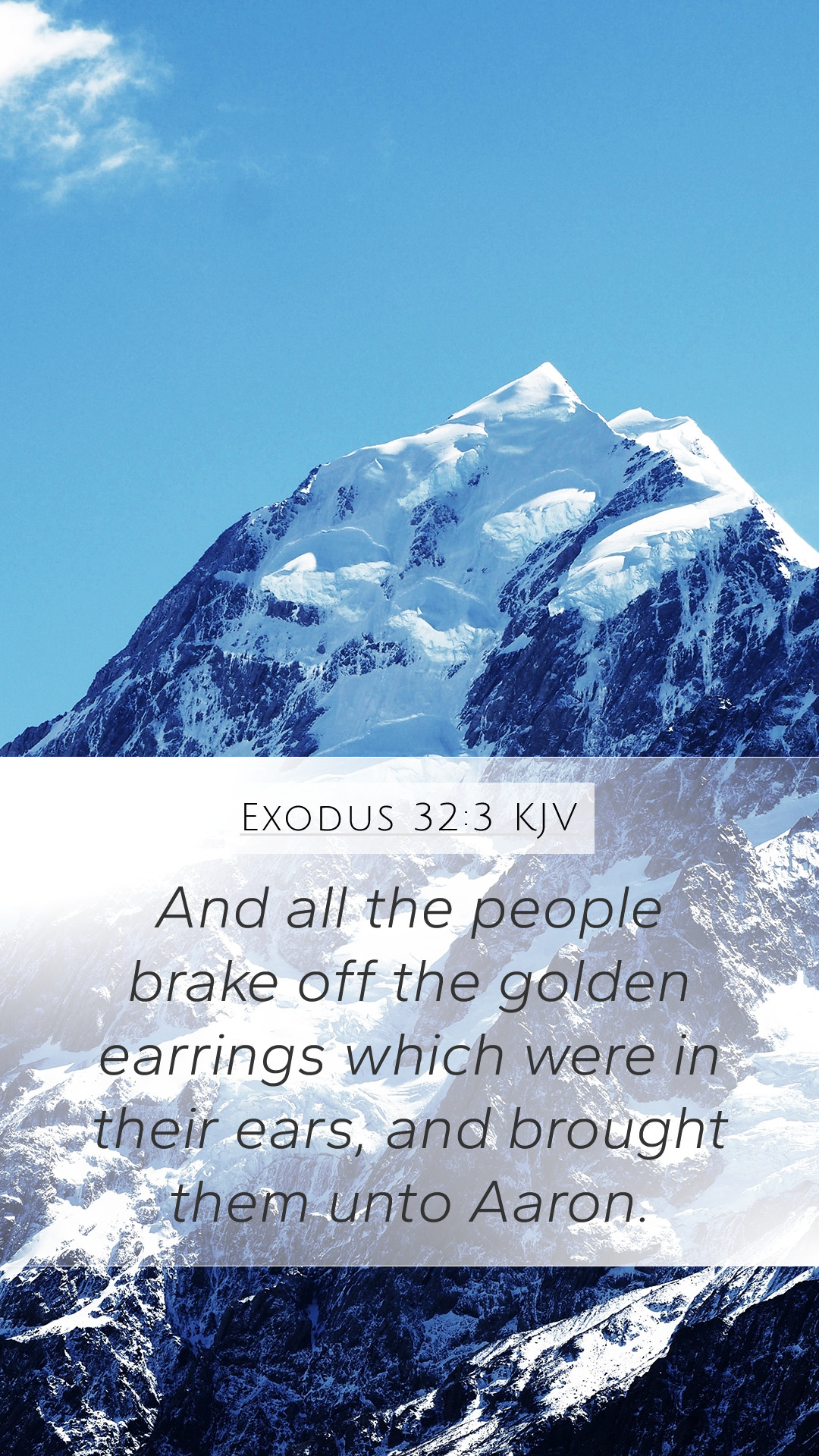Exodus 32:3 - Meaning and Commentary
Verse in Context: Exodus 32:3 states, "And all the people broke off the golden earrings which were in their ears and brought them to Aaron." This verse occurs in a pivotal moment in the narrative of the Israelites during their exodus from Egypt, detailing the people's response to Moses' delayed return from Mount Sinai.
Bible Verse Meanings
In this context, the act of the people bringing their gold to Aaron symbolizes their desire for a tangible representation of God. They were troubled by Moses' absence and sought reassurance through a physical idol, demonstrating a lack of faith and trust in God's promise.
Bible Verse Interpretations
Matthew Henry notes that the people acted hastily and without proper leadership as they turned to Aaron in a moment of fear and uncertainty. The golden calf they created is a stark reminder of humanity's propensity to gravitate towards idolatry when divine guidance seems distant.
Albert Barnes emphasizes the significance of this act as a reflection of the people's spiritual immaturity and their longing for a visible deity, which ultimately leads to their downfall. This incident also illustrates the challenges of leadership, as Aaron fails to stand against the people’s misguided demands.
Adam Clarke points out the implications of this episode on the collective faith of the Israelites. He describes how their choice to forge an idol signifies a regression into pagan practices, indicative of a deeper underlying spiritual crisis within the camp.
Understanding Scripture
The collective actions of the Israelites in Exodus 32:3 highlight a critical struggle that many face: the tension between faith and doubt. Their eagerness to craft an idol stemmed from an urgent need for a sign of God's presence, showcasing a fundamental challenge in our spiritual journeys—trusting the unseen.
Bible Verse Explanations
- Physical vs. Spiritual: The Israelites’ desire for a god they could see contrasted sharply with the spiritual God who had delivered them from slavery.
- Leadership Failure: Aaron’s role in this incident raises questions about the responsibilities of leaders and their influence on the faith of their followers.
- Symbolism of Gold: Gold often represents value and wealth in the Bible; its use in crafting the idol reveals a misplaced sense of worth and devotion.
Bible Study Insights
For those engaged in Bible study groups or utilizing Bible study tools, Exodus 32:3 serves as a rich topic for discussion. Exploring the motivations behind the people's actions can lead to deeper discussions regarding leadership, faith under pressure, and idolatry in modern contexts.
Application of Bible Verses to Daily Life
This verse invites reflection on areas in our own lives where we may be tempted to create 'idols'—whether they be material possessions, relationships, or even self-reliance—in lieu of trusting God’s presence and guidance.
Cross References
- Exodus 20:4-5: God's commandment against idolatry.
- 1 Corinthians 10:14: Paul’s warning against idolatry.
- Psalm 106:19-20: A reflection on the Israelites' idolatry at Sinai.
Historical Context of Bible Verses
Understanding the historical context surrounding Exodus 32:3 enhances its interpretation. The Israelites, just liberated from Egyptian bondage, found themselves in an unfamiliar wilderness, which likely exacerbated their fears and impulsive decision-making. This context is crucial for understanding difficult Bible passages.
In-Depth Bible Verse Analysis
To grasp the full significance of Exodus 32:3, we must consider both the immediate context of the Israelites' journey and the theological implications of their actions. This analysis can help illuminate patterns of behavior that persist throughout the Bible and into contemporary society.
Conclusion
Exodus 32:3 serves as a potent reminder of human frailty and the constant struggle between faith and doubt. Through the lens of Biblical exegesis and scripture analysis, we enrich our understanding of this pivotal moment in the Israelite journey, revealing lessons that remain relevant today.
Reflecting upon such lessons can guide our own faith journeys, encouraging trust in God’s unseen presence amidst challenges we may face.


